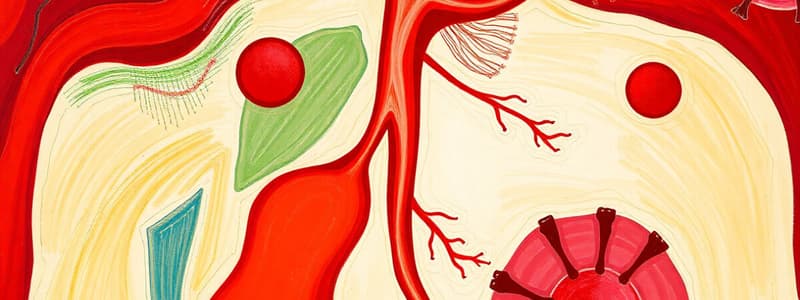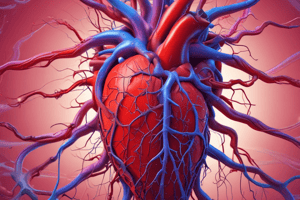Podcast
Questions and Answers
Which of the following are components of the human immune system?
Which of the following are components of the human immune system?
- Physical barriers (skin)
- Immune cells (white blood cells)
- Antibodies
- All of the above (correct)
Vaccines contain live pathogens that cause disease in order to stimulate the immune system.
Vaccines contain live pathogens that cause disease in order to stimulate the immune system.
False (B)
Antibiotics are effective against both bacterial and viral infections.
Antibiotics are effective against both bacterial and viral infections.
False (B)
What is the primary function of red blood cells?
What is the primary function of red blood cells?
What type of blood cell plays a crucial role in blood clotting?
What type of blood cell plays a crucial role in blood clotting?
Which of the following is a function of the lymphatic system?
Which of the following is a function of the lymphatic system?
Which blood group is considered the universal donor?
Which blood group is considered the universal donor?
Which blood group is considered the universal receiver?
Which blood group is considered the universal receiver?
Match the following types of immune cells with their primary function:
Match the following types of immune cells with their primary function:
The adaptive immune system is responsible for recognizing and destroying specific pathogens.
The adaptive immune system is responsible for recognizing and destroying specific pathogens.
What type of immune response is characterized by the production of antibodies?
What type of immune response is characterized by the production of antibodies?
What is the term for a substance that triggers an immune response?
What is the term for a substance that triggers an immune response?
Memory cells are responsible for the body's ability to mount a faster and more effective immune response upon subsequent exposure to the same pathogen.
Memory cells are responsible for the body's ability to mount a faster and more effective immune response upon subsequent exposure to the same pathogen.
Inflammation is a harmful response to injury or infection.
Inflammation is a harmful response to injury or infection.
The body's immune system is always capable of eliminating all pathogens.
The body's immune system is always capable of eliminating all pathogens.
Flashcards
Plasma
Plasma
The liquid component of blood that carries nutrients, hormones, and waste products.
Platelets
Platelets
Small, disk-shaped cells in blood that help in blood clotting.
Arteries
Arteries
Blood vessels that carry blood away from the heart.
Veins
Veins
Signup and view all the flashcards
Capillaries
Capillaries
Signup and view all the flashcards
Right ventricle
Right ventricle
Signup and view all the flashcards
Left ventricle
Left ventricle
Signup and view all the flashcards
Blood pressure
Blood pressure
Signup and view all the flashcards
Blood transfusion
Blood transfusion
Signup and view all the flashcards
Immune system
Immune system
Signup and view all the flashcards
Physical barriers
Physical barriers
Signup and view all the flashcards
Phagocytes
Phagocytes
Signup and view all the flashcards
Lymphocytes
Lymphocytes
Signup and view all the flashcards
Dendritic cells
Dendritic cells
Signup and view all the flashcards
Macrophages
Macrophages
Signup and view all the flashcards
Neutrophils
Neutrophils
Signup and view all the flashcards
Inflammation
Inflammation
Signup and view all the flashcards
Pathogens
Pathogens
Signup and view all the flashcards
Lymphatic system
Lymphatic system
Signup and view all the flashcards
Antigens
Antigens
Signup and view all the flashcards
Foreign antigens
Foreign antigens
Signup and view all the flashcards
Self antigens
Self antigens
Signup and view all the flashcards
T-cells
T-cells
Signup and view all the flashcards
B-cells
B-cells
Signup and view all the flashcards
Antibodies
Antibodies
Signup and view all the flashcards
Memory cells
Memory cells
Signup and view all the flashcards
Bacteria
Bacteria
Signup and view all the flashcards
Fungi
Fungi
Signup and view all the flashcards
Viruses
Viruses
Signup and view all the flashcards
Study Notes
Blood and Circulation
- Blood is composed of plasma (liquid), red blood cells (oxygen transport), white blood cells (immune response), and platelets (blood clotting).
- The circulatory system includes arteries (blood away from heart), veins (blood to heart), and capillaries (gas/nutrient exchange). The heart has two sides, right side pumps deoxygenated blood to lungs, left side pumps oxygenated blood to the body.
- The heart has four chambers: two atria and two ventricles. Valves prevent backflow. The heart's pumping is controlled by electrical signals from the pacemaker.
- Blood pressure is the force exerted by blood on vessel walls, affected by factors like activity and stress. High blood pressure can cause heart disease and stroke.
- Blood transfusions involve transferring blood products intravenously. Compatibility between blood types (A, B, AB, O) is crucial to prevent reactions. O is the universal donor, AB is the universal recipient.
Disease and Immunity
- The body has immune mechanisms (physical barriers, immune cells, antibodies) to fight pathogens (disease-causing organisms).
- Vaccines use weakened pathogens to create immunity without causing illness.
- Antibiotics kill or stop bacteria growth; antibiotic misuse leads to resistance.
- Disease occurs when the body doesn't function properly or foreign substances enter it.
- Symptoms are patient-reported disease manifestations while signs are observable ones.
- The immune system has innate (present from birth) and adaptive (learns from experiences) components.
- Lines of defense include barriers, phagocytes, and lymphocytes (with specific pathogen killing).
Pathogens and the Body Defence System
- Pathogens are disease-causing microorganisms (e.g., bacteria, fungi, viruses).
- Pathogens enter the body through various routes (respiratory system, skin, contaminated food/water).
- Bacteria are single-celled organisms that multiply.
- Fungi are like plants without chlorophyll; often linked to poor hygiene.
- Viruses are intracellular parasites that replicate using host cells.
- Barriers prevent pathogens entering the body (mechanical and chemical).
- The lymphatic system (vessels, nodes, bone marrow, spleen, thymus) is the body's 'sewage' system with immune cell screenings.
- Antigens are small pathogen parts that trigger immune responses.
- Some antigens are foreign (from outside the body) while others are self antigens (part of the body).
- Dendritic cells, macrophages, and neutrophils are phagocytes.
Adaptive Immune System
- The immune system can distinguish between foreign and self antigens.
- T- and B-lymphocytes recognize specific antigens; new ones are continually created.
- T-cells activate B-cells and macrophages, boosting their pathogen-fighting abilities.
- B-cells produce antibodies, which disable pathogens by prevention of movement/interaction.
- Memory cells (B and T) remain after an immune response and quickly react to subsequent exposure.
Studying That Suits You
Use AI to generate personalized quizzes and flashcards to suit your learning preferences.




